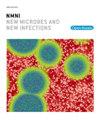Ferritin's role in infectious diseases: Exploring pathogenic mechanisms and clinical implications
IF 5.4
Q2 INFECTIOUS DISEASES
引用次数: 0
Abstract
Ferritin, an iron storage protein, is crucial for maintaining iron metabolism balance throughout the body and serves as a key biomarker for evaluating the body's iron reserves. Reduced ferritin levels typically indicate iron deficiency, whereas elevated ferritin levels indicate an acute inflammatory response in infectious diseases. Recent research has established a significant link between elevated ferritin levels and disease severity and prognosis. The concept of hyperferritinemic syndrome has underscored ferritin's role as a pathogenic mediator. During infections, ferritin not only serves as a biomarker of inflammation but also exerts pro-inflammatory functions, which is a key factor in perpetuating the vicious pathogenic cycle. This review offers a comprehensive exploration of ferritin, covering its structural characteristics, regulatory mechanisms, and how diverse pathogens modulate ferritin. Understanding its pivotal role in infectious diseases is essential for identifying novel therapeutic prospects and enhancing disease management and prevention.
铁蛋白在感染性疾病中的作用:探讨致病机制及其临床意义
铁蛋白是一种铁储存蛋白,对维持全身铁代谢平衡至关重要,是评估人体铁储备的关键生物标志物。铁蛋白水平降低通常表明缺铁,而铁蛋白水平升高表明感染性疾病的急性炎症反应。最近的研究已经确定了铁蛋白水平升高与疾病严重程度和预后之间的重要联系。高铁素血症综合征的概念强调了铁蛋白作为致病介质的作用。在感染过程中,铁蛋白不仅作为炎症的生物标志物,还发挥促炎功能,是恶性循环持续的关键因素。本文综述了对铁蛋白的研究进展,包括其结构特征、调控机制以及不同病原体如何调控铁蛋白。了解其在传染病中的关键作用,对于确定新的治疗前景和加强疾病管理和预防至关重要。
本文章由计算机程序翻译,如有差异,请以英文原文为准。
求助全文
约1分钟内获得全文
求助全文
来源期刊

New Microbes and New Infections
Medicine-Infectious Diseases
CiteScore
10.00
自引率
2.50%
发文量
91
审稿时长
114 days
 求助内容:
求助内容: 应助结果提醒方式:
应助结果提醒方式:


